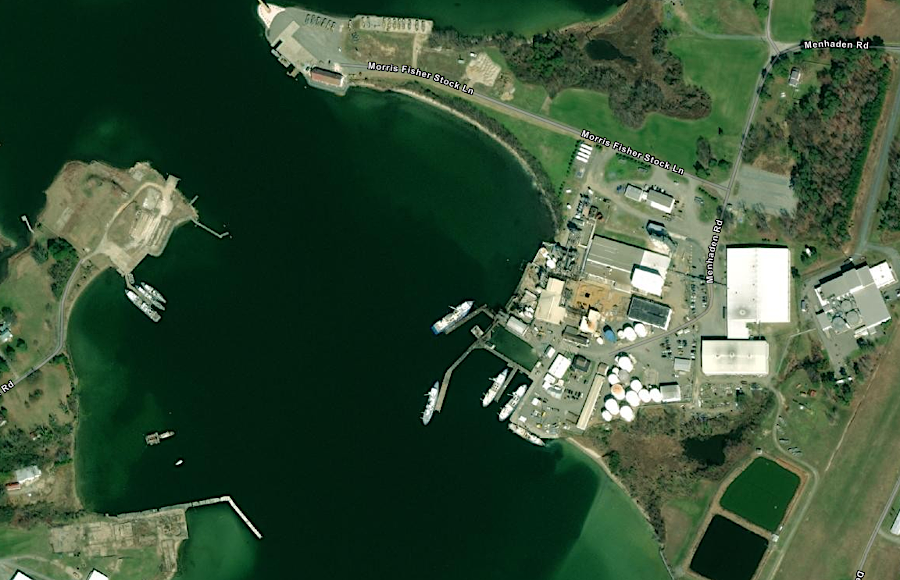
menhaden fishing is centered on the Omega Protein processing plant in Reedville, the last remaining facility on the East Coast that still extracts fish oil from menhaden
Source: ESRI, ArcGIS Online

menhaden fishing is centered on the Omega Protein processing plant in Reedville, the last remaining facility on the East Coast that still extracts fish oil from menhaden
Source: ESRI, ArcGIS Online
Atlantic menhaden (Brevoortia tyrannus) may be the most important fish in the Chesapeake Bay. The species supports a major industrial fish processing plant in Reedville, which creates fish oil rich in Omega-3 fatty acids. Menhaden, which are also known as mossbunker, fatbacks, bunker, alewife, and pogy, strain phytoplankton and zooplankton from the water, filtering and converting excessive amounts of algae into fish protein. Other fish - especially striped bass or "stripers" (Morone saxatilis) - then feed on the menhaden, as do ospreys and bald eagles.
The Chesapeake Bay is a nursery where juvenile menhaden grow, before moving out into the Atlantic Ocean. The bay's populations are lower than in the 1960's-1980's. Because menhaden are food for striped bass and other species, their decline may be affecting efforts to increase the populations of the forager fish.
The reduced numbers of menhaden within the bay creates other ecological impacts as well. Without vast schools of menhaden, algae in the bay is underutilized. After the algae dies, it decays on the bottom of the Chesapeake Bay and creates oxygen-deficient dead zones. When oysters, menhaden, and other filter feeders strip algae from the waters of the Chesapeake Bay, the clarity of the water improves, Submerged Aquatic Vegetation (SAV) can grow better, and other aquatic life such as blue crabs can utilize the bottom without starving for oxygen.
Humans do not eat menhaden directly, not even in fish tacos or reconstituted into fake crab meat; the fish is too oily and bony. The fish are caught to be used as bait, or to be converted into a food supplement.
Virginia is the last place on the East Coast where menhaden is cooked, "reducing" it to extract the oil. The Omega-3 fatty acids in the oil are used in food supplement pills. The cooked and pressed remains of the menhaden, after oil extraction, are used for pet food or as fertilizer.
Though use of protein-rich fish meal just as fertilizer may appear to be wasteful, there is a long tradition of using menhaden for that purpose. According to the National Oceanic and Atmospheric Administration (NOAA):1
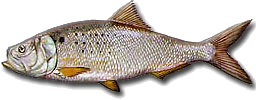
Atlantic menhaden
Source: US Fish and Wildlife Service
Factories to "reduce" menhaden to oil and protein leftovers were once common from Maine to Florida, as well as on the Gulf Coast. After the Civil War, Elijah Reed moved from Maine to Old Point Comfort, then to Cockrell's Creek in 1874. Many small fish processing operations were located on multiple points of land on the western edge of the Chesapeake Bay, originally cooking menhaden in kettles and skimming off the oil.
All of the menhaden processing factories have disappeared now except for the Omega Protein operation in Northumberland County. A fish reduction facility has operated continuously on Cockrell Creek at Reedville since 1878. The only fish refinery left on the East Coast still cooks menhaden to separate it into fish oil used for Omega-3 diet supplements and protein for animal meal. In 2020, Omega Protein employed 260 people at its fish factory in Reedville, making it the second-largest employer in the county after the school system.2
Today, menhaden stocks are dramatically reduced, primarily due to overharvesting. Because menhaden travel in large "schools," large numbers can be caught in nets.
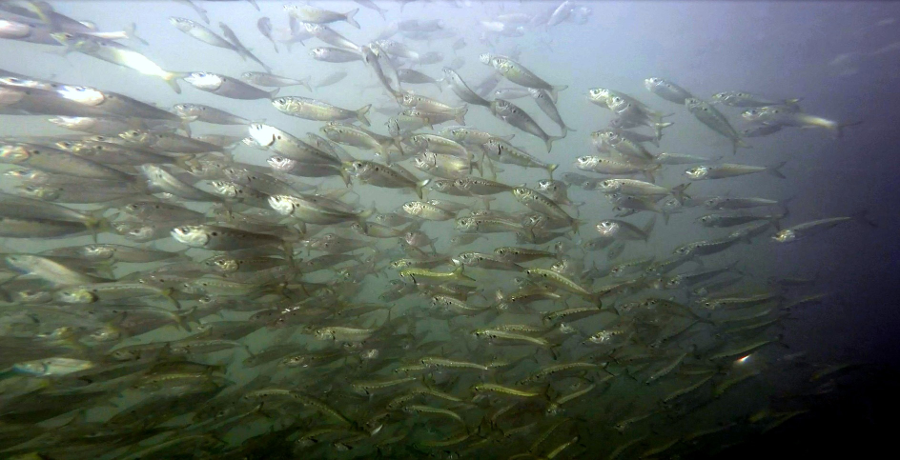
menhaden travel in "schools"
Source: National Oceanic and Atmospheric Administration (NOAA), Northeast Fisheries Science Center, Photo Gallery
Processing the large number of inedible menhaden into useable products is an industrial operation. Though the historical level of pollution has been reduced, waste management is still a challenge. In 2013, a Federal judge fined the company $5.5 million - plus a $2 million company "donation" for Chesapeake Bay restoration projects - because waste disposal from menhaden processing had violated the Clean Water Act.
Omega Protein was allowed to dump "bail water" from its fishing vessels, which included fish scales, fins and fish excrement, more than three miles from the coast into the Atlantic Ocean. Instead, the bail water was dumped into the Chesapeake Bay, increasing the bay's excessive amount of nutrients such as nitrogen. In addition, Omega Protein also was fined for modifying its fishing vessels to dump oily bilge water illegally.3
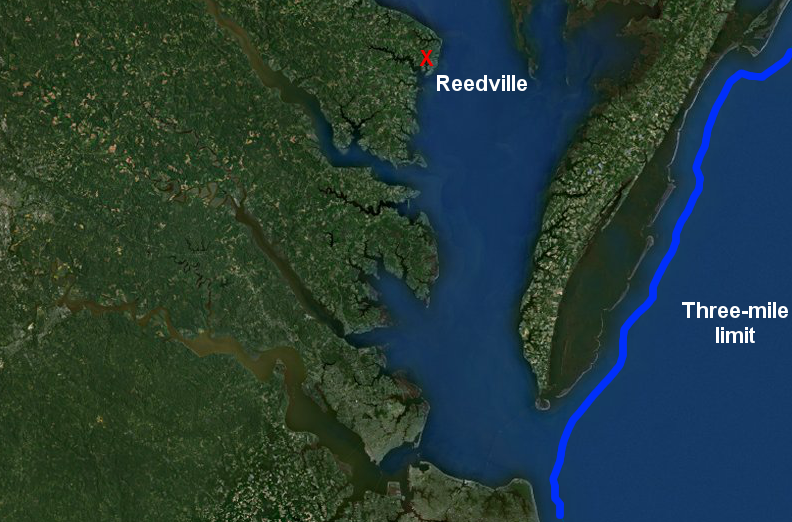
Omega Protein dumped "bail water" illegally into the Chesapeake Bay, rather than haul it beyond the three-mile limit into the Atlantic Ocean
Source: MarineCadastre.gov
The company hires 7-10 catch boats to surround the menhaden schools with nets, "setting" overtop the schools of fish in the Chesapeake Bay or in the Atlantic Ocean, then load the fish onto the boats. Virginia still permits commercial harvest within the state waters, up to three miles from the coast. Beyond the three mile limit to the edge of the Exclusive Economic Zone (EEZ) 200 miles offshore, the Federal government controls natural resources.
Omega Protein, the last remaining commercial menhaden fishing operation on the Atlantic Coast, harvests 80% of the menhaden that are caught. Bait fishermen catch the remaining 20%, to use in crab pots or put on hooks to catch striped bass.
Source: Omega Protein, Omega Protein: Our Menhaden Fishing Family
Conservationists have regularly battled with Omega Protein, petitioning the Atlantic States Marine Fisheries Commission to reduce the permitted harvest so menhaden populations can recover. In 2011 the commission reduced the acceptable harvest level to leave 30 percent of the adult population to spawn annually, as opposed to 8 percent at the time.4
Menhaden are born in the Atlantic Ocean, especially offshore of Cape Lookout, North Carolina between December-February. Larvae are carried by wind-blown currents into the Chesapeake Bay (and other estuaries along the Atlantic Ocean coastline) after a few months. In the estuaries the larval menhaden grow, metamorphose into filter-feeding juveniles (losing teeth in the process), then assemble into dense schools.
From August through November, they migrate back to the ocean and overwinter off the North Carolina coast. In following years, adults migrate each summer as far north as the Massachusetts/Maine coast and in winter down to North Carolina coast, maturing after 2-3 years.5
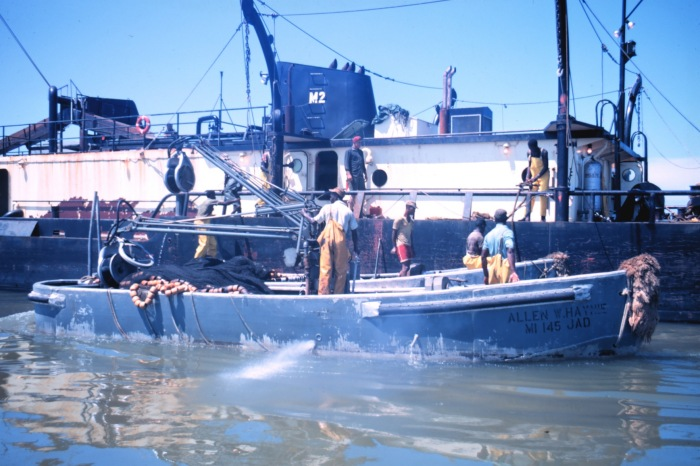
menhaden caught in nets are transferred to the mother ship for transport to a reduction center, where the valuable fish oil is extracted
Source: National Oceanic and Atmospheric Administration (NOAA), Enforcement Reform Frequently Asked Questions and Answers (FAQ)
As described by the Virginia Institute of Marine Science:6
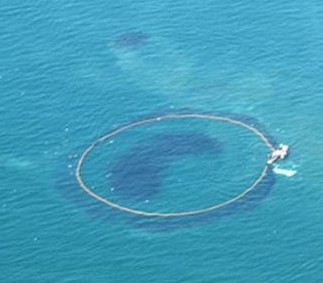
catching menhaden in a purse net, after surrounding a school
Source: Omega Protein, Shareholder Presentation (May 17, 2011)
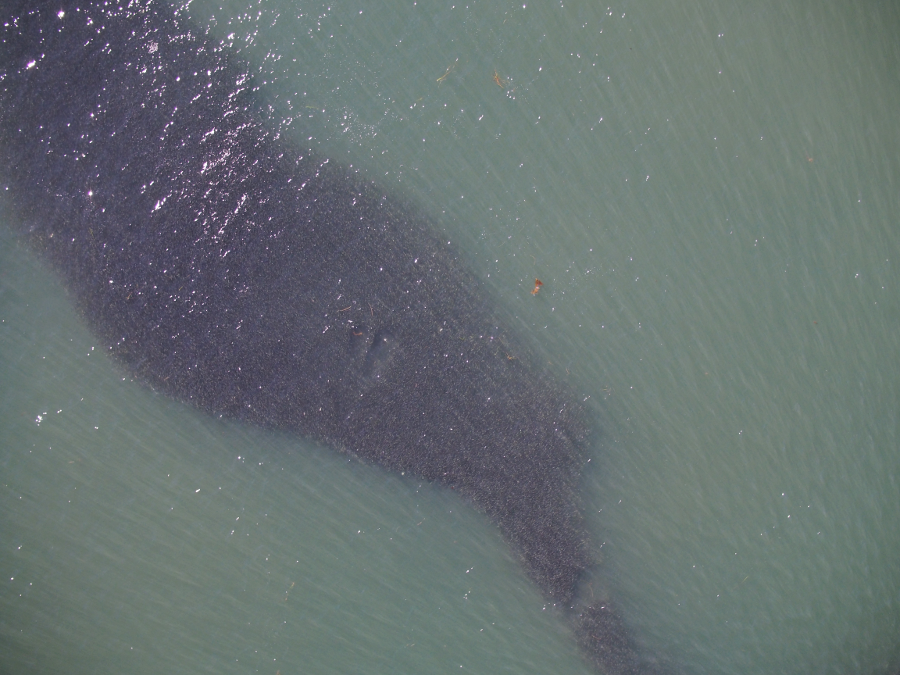
menhaden schools are spotted by light aircraft and helicopters, and boats are then directed to the best locations for commercial harvest
Source: National Oceanic and Atmospheric Administration (NOAA), Northeast Fisheries Science Center, Photo Gallery
Menhaden are not a threatened or endangered species. There are plenty in the Atlantic Ocean, but conservationists fear that over-fishing could result in "ecological depletion" in the Chesapeake Bay. In addition to ecological concerns, one key debate is between commercial vs. recreational users: does commercial harvest of menhaden reduce the number of rockfish that can be caught by recreational anglers?
In Virginia, menhaden was until 2020 the only species where the General Assembly itself managed harvest seasons and limits. The Virginia Marine Resources Commission demonstrated its ability to reject arguments regarding the costs of limiting harvests, and focus on long-term economic recovery of a species, when it banned the winter dredge fishery for blue crabs. However, for many years the General Assembly of Virginia retained direct authority over the fishing season for menhaden. That ensured the Virginia Marine Resources Commission would not have the option to limit the catch of menhaden, except with the approval of the legislators. Protection of Omega Protein finally ended when the Federal government intervened.
In 2019, the Department of Commerce endorsed an action by the Atlantic States Marine Fisheries Commission (ASMFC), the interstate organization that sets harvest limits on menhaden. The ASMFC was created through an interstate compact ratified by Congress in 1942. It manages over 20 species of migratory fish in state waters along the Atlantic Ocean shoreline, restraining the temptation of one state to overharvest a species while other states tried to conserve it.
The power of that commission to regulate fish harvests from coastal waters was strengthened by later legislation, including the Atlantic Coastal Fisheries Cooperative Management Act in 1993. The Secretary of Commerce was authorized to block a state from fishing within the waters of the noncomplying State, asserting authority over state waters within three miles of the shoreline. ASMFC has no authority over the Exclusive Economic Zone.
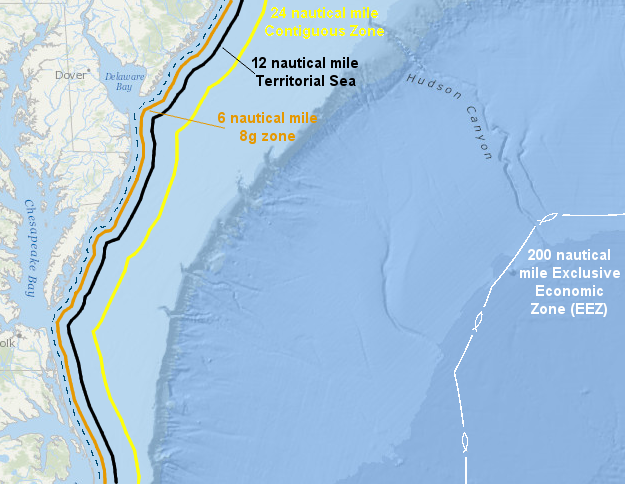
significant offshore boundaries beyond the three mile boundary
Source: Bureau of Ocean Energy Management, Regulation, and Enforcement, Multipurpose Marine Cadastre
The first ASMFC management plan for menhaden was approved in 1981. In 2005, the commission amended its Interstate Fishery Management Plan for Atlantic Menhaden and established a limit on the menhaden catch in the Chesapeake Bay - waters under the control of Virginia and Maryland.
The Virginia General Assembly refused to pass legislation to implement that limit, and in 2006 the state's Attorney General wrote an opinion that the interstate commission had exceeded its legal authority. Despite that opinion, Omega Protein agreed to comply voluntarily with the limit after the commission approved it again in 2006.7
In 2009, the ASMFC Menhaden Technical Committee updated its computer model and discovered that the old version had seriously miscalculated the status of the menhaden population. In 2011, the ASMFC proposed reducing the total allowable catch (TAC) of menhaden within the Chesapeake Bay, and also limiting the menhaden harvest in the waters of the Atlantic Ocean. The commission determined that reducing both the commercial harvest, and the harvest for bait fish (including in New England lobster traps), would help to increase the population of mature adults.
The new fishing mortality target was set at no more than 30% of the Maximum Spawning Potential, up from the 8% assumption that guided the 2006 limits. The proposal from the Virginia representative to set the limit at 20% of the Maximum Spawning Potential was rejected. By preserving essentially 30% of the fish rather than 8% or 20%, the wild fish population could recover faster - but harvests would have to be reduced substantially.8
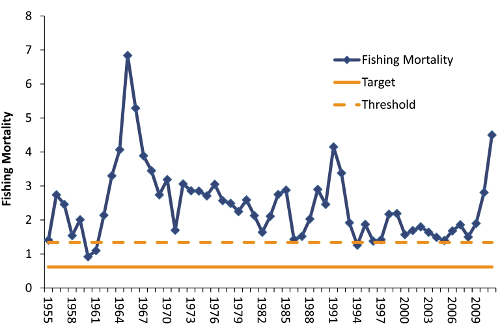
for decades, menhaden have been over-fished and populations have plummeted as a result
Source: Atlantic States Marine Fisheries Commission, Atlantic Menhaden - 2012 stock assessment
Striped bass anglers and conservationists supported the change, based on concerns that the menhaden population was so low that striped bass were starving in the bay. Omega Protein was opposed, and it was unclear if Virginia would comply with that new limit. The State Senator representing the Reedville area proposed Virginia should withdraw from the commission, though the state would still be obliged to comply with the new limit.9
The worst-case scenario was that the Secretary of Commerce would react to Virginia's failure to control overfishing, and order a complete ban on menhaden fishing within both Virginia and Federal waters off the Virginia coast. That action would trigger a legal test of the constitutional authority of the ASMFC, delaying or potentially blocking the implementation of a fishing mortality target set by the ASMFC.
The Atlantic States Marine Fisheries Commission imposed a 20% reduction in December 2012. Virginia's 2013 General Assembly did agree to comply with the ASMFC reduction for two years, even though Omega Protein announced that a reduction would trigger elimination of one of the vessels in its fishing fleet. The company claimed the lower limit would eliminate $20 million/year in revenues, so Omega Protein would have to cut expenses.10
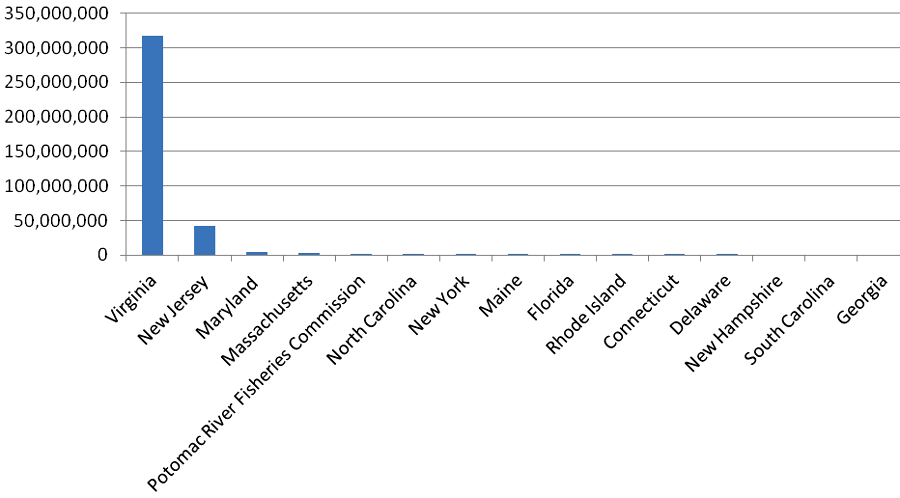
the Atlantic Menhaden quota (in pounds) for Virginia, as determined by the Atlantic States Marine Fisheries Commission in 2012, dwarfed the allocation for other states
Source: data from Atlantic States Marine Fisheries Commission news release, First Year of Atlantic Menhaden Amendment 2
Implementation Yields Positive Results (May 16, 2014)
For the 2013 season, Omega Protein announced plans to reduce on-land employment by 10 workers and on-water employment by 30 workers. The company cut back to a seven-ship fleet, down from nine ships in 2011 and eight in 2012. The 2013 fleet included two ships that previously serviced oil rigs in the Gulf of Mexico, and were reconditioned for Virginia in order to store fish in refrigerated tanks and to meet Coast Guard requirements for bilge water discharge.11
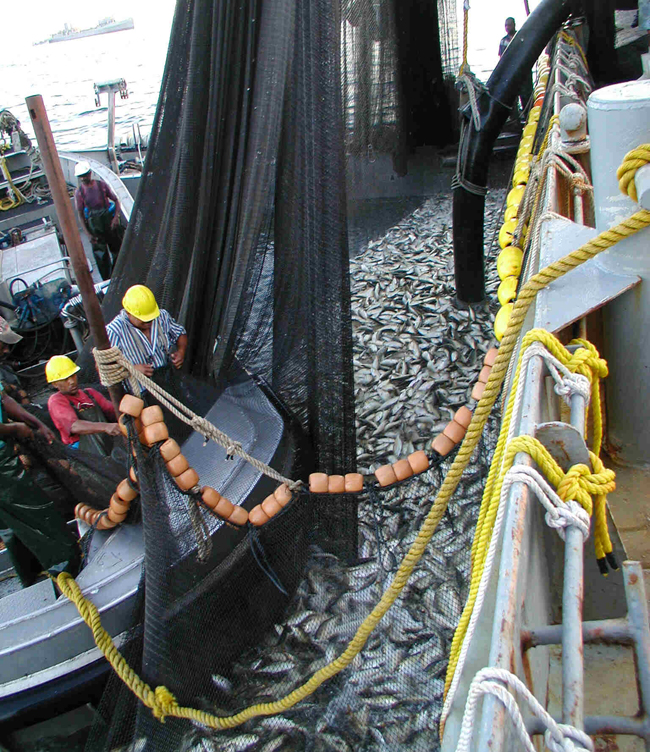
Federal officials survey commercial menhaden catches to estimate the status of the population
Source: National Oceanic and Atmospheric Administration (NOAA), Biostatistical Menhaden Surveys
In 2015, the Atlantic States Marine Fisheries Commission again revised its assessment of the menhaden population. The commission recalculated the biomass, the total number of pounds of menhaden swimming in the Chesapeake Bay and Atlantic Ocean. It concluded that some menhaden reproduced in their second year, not just after three years. In addition, older fish in the northern part of the range were larger than had been calculated previously, so total biomass was not below average for the last decade, the population was healthy, and menhaden were not over-fished.
The results triggered proposals to increase the menhaden harvest, especially for the fishermen who caught the fish to use as bait for other species such as rockfish. The counter-argument advanced by some conservationists was that the number of small menhaden in the Chesapeake Bay was still insufficient to support other species as a food source, and that an assessment of the biomass of a single species needed to be expanded to consider the ecological role of menhaden.12
In 2017, the Atlantic States Marine Fisheries Commission determined that the overall menhaden catch was sustainable, but not in the Chesapeake Bay. It set a new cap of 51,000 metric tons within the bay, substantially lower than its first cap set in 2006. The 2006 limit was 109,020 metric tons. It was based on the average harvest within the bay (excluding Atlantic Ocean harvest) by Omega Protein over the previous five years. Since an average menhaden weighed 0.46 pounds, an authorized catch of 51,000 metric tons equaled 244 million fish.
A new cap of 87,216 metric tons was set by the regional fisheries commission in 2012, and that limit was endorsed by the General Assembly. Between 2012-2017, Omega Protein had never harvested more than 51,000 metric tons from the bay.
Also in 2017, the Canadian company Cooke Inc. acquired Omega Protein for $500 million. Cooke Inc. was considered the world's largest independent seafood company. In a corporate reorganization, the 30-vessel shipping fleet became part of a separate organization, Alpha VesselCo, LLC. Omega Protein contracted for the fleet, and when a new vessel was launched in 2018 the event was hosted by Omega Protein rather than Alpha VesselCo, LLC.
In 2018 the Virginia General Assembly refused to endorse the revised cap of 51,000 metric tons. The Atlantic States Marine Fisheries Commission considered penalizing the state, but feared that the Secretary of the Department of Commerce in the Trump Administration would not support such action. The final compromise was a decision to do nothing unless Omega Protein exceeded the cap.
The company caught only 35,000 metric tons of menhaden in the bay in 2018, since the best fishing that year was in the Atlantic Ocean. The company caught 141,000 metric tons in total, 93% of the authorized catch. The Reedville plant processed the menhaden into 8,000 metric tons of fish oil and 46,000 metric tons of fish meal.
In 2019, the Marine Stewardship Council certified Omega Protein's menhaden program as a "sustainable" wild-capture fishery. The certification process required two years, and involved hiring an independent adjudicator after environmental groups objected to the proposal.13
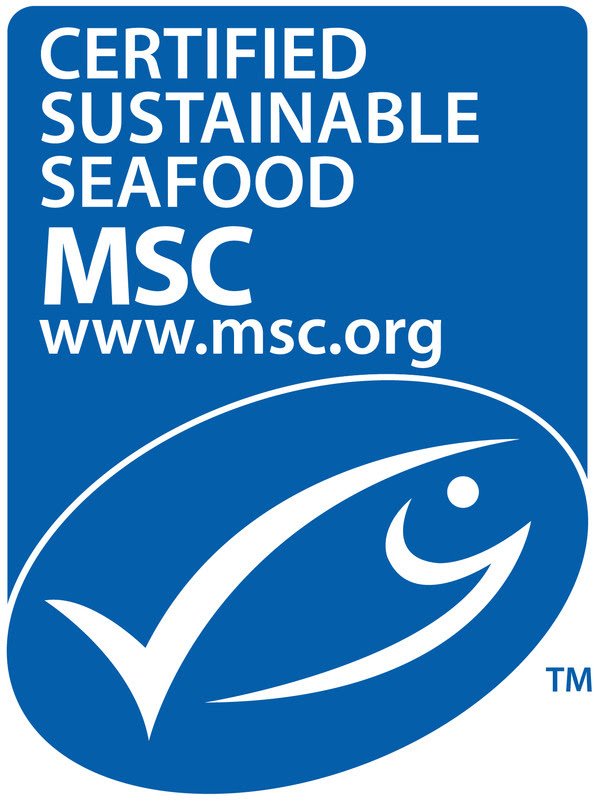
in 2019, Omega Protein got the Marine Stewardship Council to certify the menhaden fishery as "sustainable"
Source: Omega Protein, It's Official: Atlantic Menhaden Fishery Achieves MSC Sustainability Certification
The state legislature repeated the pattern in 2019 and declined to require Omega Protein to comply with the 51,000 metric ton limit. However, fishing patterns were different that year. Storms in the Atlantic Ocean made it safer to fish inside the Chesapeake Bay, and disrupted the menhaden schools in the Atlantic Ocean so purse seining was not possible at times.
By September, 2019, Omega Protein reported to state officials that it had exceeded the Atlantic States Marine Fisheries Commission cap. A company spokesperson said:14
The United Food and Commercial Workers Local 400, which represented the unionized workers for Omega Protein, made clear that it supported the company's decision to exceed the cap:15
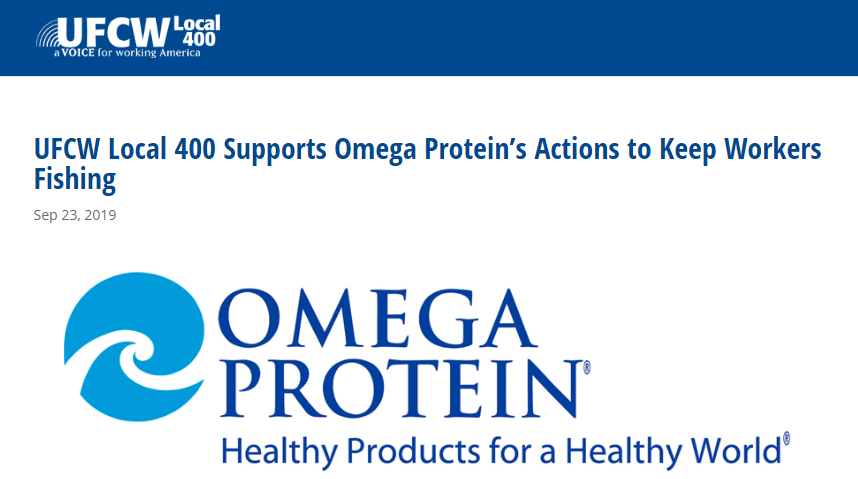
in 2019, United Food and Commercial Workers Local 400 expressed support for Omega Protein exceeding the limit inside the Chesapeake Bay
Source: United Food and Commercial Workers Local 400
The Atlantic States Marine Fisheries Commission had the option on initiating a non-compliance finding and forwarding recommended actions to the Secretary of Commerce. The menhaden panel of the commission started that process in October, 2019. It was the first step required to trigger a moratorium on fishing for menhaden in Federal waters.
The vote was unanimous; even Virginia's representative endorsed it. A commercial fisherman who served as the Rhode Island representative to the commission expressed his frustration at Virginia's failure to protect the menhaden from overfishing:16
Such a ban would require action by Wilbur Ross, Secretary of the Department of Commerce in the Trump Administration. In 2017, he declined to honor recommendations by fisheries managers when he allowed New Jersey to continue to overharvest the summer flounder stock, ignoring the commission's proposed limits on size limit and daily catch. New Jersey politicians had lobbied the Secretary of Commerce to prioritize the short-term benefits for the state's tourism economy over the long-term need to restore the summer flounder population.
The failure to act in 2017 was the first time since the Atlantic States Marine Fisheries Commission was formed in 1942 that its recommendations were not followed by the Secretary of Commerce. In response to the failure to act on New Jersey overfishing, the chair of the commission said:17
Source: Pew, Help Save Menhaden: Quite Possibly, the Most Important Fish in the Sea
Natural resource management clearly involves a requirement to understand politics as well as science. The commission was reluctant to create another precedent where a political appointee in the Federal government might give Virginia's politicians the opportunity to prioritize local short-term economic benefits over regional long-term resource protection.
A potential excuse for delay was to allow time for publication of two scientific studies in early 2020. One study was designed to assess the fishery from an ecological management perspective, and how the harvest affected food sources and behavior of other species such as striped bass and osprey. The commission's shift from single-species management to an ecosystem approach started with menhaden; it was the pioneer species for the new process.
The other study was designed to refine the number of menhaden present in the Chesapeake Bay and the Atlantic Ocean. Menhaden were increasing in waters off New England, but the population levels within the Chesapeake Bay were declining.18
Waiting for those studies before responding to the over-fishing would allow the Atlantic States Marine Fisheries Commission to make recommendations when the General Assembly would be in session. The legislators could then claim they needed more time to assess the studies. One political option was to delay a request for action by the Secretary of Commerce until after the 2020 presidential election. Even if President Trump was re-elected, the odds were high that he would appoint a new Secretary of Commerce in his second term.
However, the full Atlantic States Marine Fisheries Commission found Virginia to be out of compliance with the Chesapeake Bay Reduction Fishery Cap. The Virginia commissioner was a new representative. The previous one had emphasized that menhaden were not a declining stock when their overall range was considered, and the science did not demonstrate a localized depletion of menhaden in the Chesapeake Bay. Taking no action would have been consistent with Omega Protein's claim that the limits on menhaden fishing proposed by the Atlantic States Marine Fisheries Commission were arbitrary and not based on science.
The new commissioner from Virginia apologized for the situation, and in late 2019 he voted for Federal action to stop the overfishing within the bay.
That vote initiated a requirement for the US Secretary of Commerce to make a decision:19
In response to the action by the Atlantic States Marine Fisheries Commission, Gov. Ralph Northam wrote to the Secretary of Commerce and endorsed an immediate Federal freeze on menhaden fishing in the Atlantic Ocean. The letter was sent when Omega Protein's fishing operations in the Chesapeake Bay were scheduled to end, but a Federal moratorium would stop menhaden fishing in the Atlantic Ocean before that season ended.
The company continued to contest the claim that there was excessive harvest. The fish it caught in the Chesapeake Bay in 2019 had, in previous years, schooled in the Atlantic Ocean just a few miles away. Omega Protein did not accept that the menhaden population was overfished simply because the schools were on the bay side of Cape Charles/Cape Henry in 2019 rather than on the ocean side.
Like the Atlantic States Marine Fisheries Commission, Gov. Northam had a platform to express an opinion but no authority to actually affect the fishing season or harvest levels. The Virginia General Assembly had all authority over menhaden management by the state of Virginia. The US Secretary of Commerce had control over harvest levels in Federal waters (three miles and further offshore) through the Mid-Atlantic Fishery Management Council, and in state waters through the Atlantic States Marine Fisheries Commission
An Omega Protein spokesperson expressed the company's opinion that the reduced harvest level for the Chesapeake Bay, the 51,000 metric ton limit, was set by non-scientific criteria, with an objective other than maintaining a sustainable population of menhaden:20
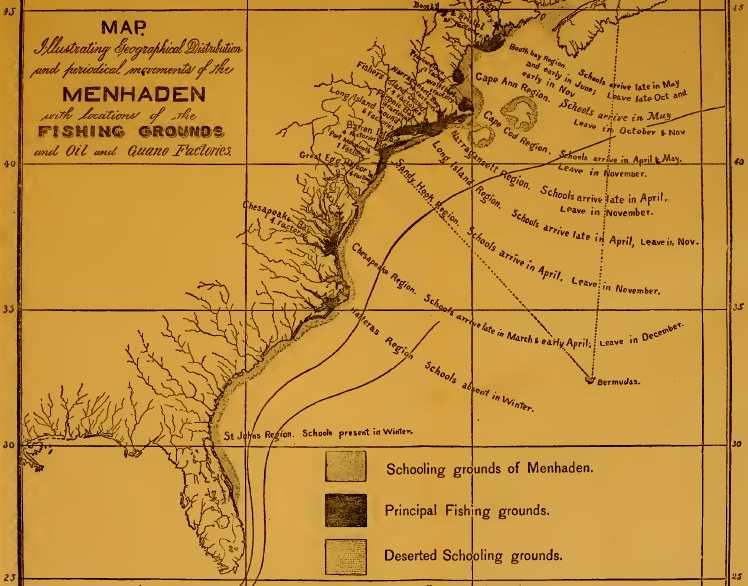
factories to "reduce" Atlantic menhaden to oil and protein scrap were once located along the entire coastline
Source: A History of the Menhaden (published in 1880, Figure 12)
One political factor was the purchase of Omega Protein by a Canadian company. Foreign ownership was emphasized in a Letter to the Editor from the chair of the Virginia Agricultural Council, as he highlighted the opinion that over-fishing of the menhaden was causing rockfish to feed outside the Chesapeake Bay:21
In December 2019, the Federal government agreed to the request from Gov. Northam and eight other governments of states in the Atlantic States Marine Fisheries Commission. The National Oceanic and Atmospheric Administration (NOAA) notified the commission:22
The Atlantic States Marine Fisheries Commission timed its request for a moratorium on catching menhaden in the Chesapeake Bay (the state waters of value to Omega Protein) to trigger a Federal response after the 2019 fishing season had ended, and long before the 2020 season started the following summer.
The scheduling also gave Omega Protein six months to work with the menhaden fishery regulators and agree on maximum harvest levels, so the moratorium could be lifted before the fishing season began.
If the moratorium did remain in place throughout 2020, or if commercial menhaden fishing was eliminated in the Chesapeake Bay and allowed only in the Atlantic Ocean, the economic impacts on Reedville would have been substantial. A 2017 economic impact study on closure of Omega Protein estimated it would reduce local employment by 8%, and cause a 14% drop in incomes within Northumberland County.23
Both the company and the General Assembly were unwilling to cede authority over Virginia's menhaden harvest to the Atlantic States Marine Fisheries Commission. When the Secretary of the Department of Commerce chose to support the commission's decision, the legislators, the corporation, and the union representing 90% of Omega Protein's fishermen negotiated a deal.
The General Assembly abandoned its unique control of the menhaden fishery during the legislature's 2020 session. Fear of Federal control finally convinced the legislators to transfer responsibility for managing the menhaden harvest to the Virginia Marine Resources Commission.
The Virginia Marine Resources Commission gained authority to regulate menhaden harvest, but with some constraints. Regulations for each year had to be completed by December 31 of the previous year, ensuring the company had adequate time to plan for its capital expenses and retire boats that might become excess equipment.
One delegate from the Eastern Shore noted that transferring the responsibility to the Virginia Marine Resources Commission (VMRC) did not guarantee that menhaden harvests would be based on scientific data. He commented as the negotiations were being resolved:24
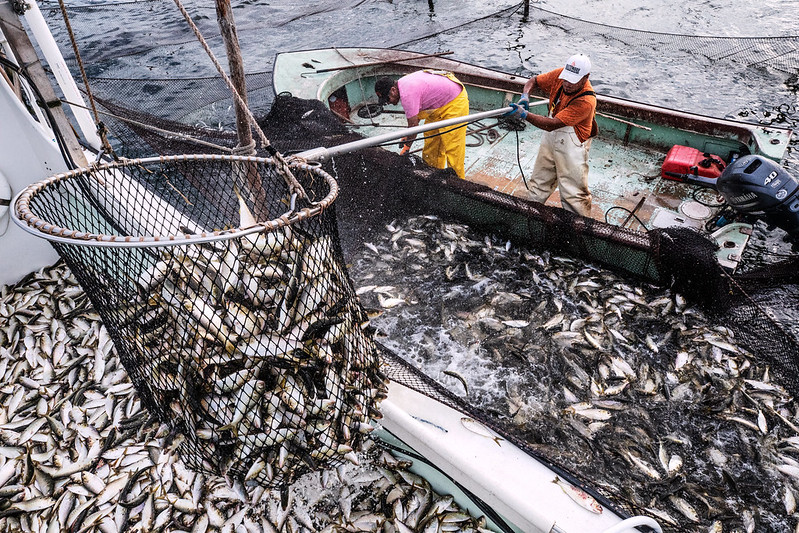
schools of menhaden are trapped in a purse seine net, then lifted into boats
Source: Chesapeake Bay Program, Menhaden fishing on the Chesapeake Bay near St. Mary's County, Maryland
Omega Protein planned to start fishing in 2020 with all of its seven boats based at Reedville. At the start of the season in May, most of the menhaden are caught west of the Chesapeake Bay Bridge Tunnel, and that harvest will not be affected by the tight Chesapeake Bay limit. The company anticipated it would need to tie some up some boats at the dock, once the fish schools moved in the summer months from the ocean into the Chesapeake Bay.
Regarding how employment would be affected by the harvest limits, a spokesperson stated:25
In its first action after receiving authority to manage the menhaden harvest, the Virginia Marine Resources Commission chose to reduce the Chesapeake Bay quota below the 51,000 tons cap proposed by the Atlantic States Marine Fisheries Commission. It set the 2020 cap at slightly more than 36,000 tons. The 14,000 ton difference matched the overharvest in 2019.
The state agency said it would raise the cap to 51,000 tons in 2021, provided Omega Protein did not exceed the 36,000 ton level in 2020. The company was not given credit for its below-the-cap catches in 2017 (19,500 tons) and in 2018 (31,000 tons). The fisheries managers declined to use a five-year running average to conclude Omega Protein's catches were sustainable, and declined to agree with the company's claims that there was no scientific basis for the 51,000 ton cap.
Omega Protein planned to use all nine boats in 2020, but have them spend most of their time catching menhaden in the Atlantic Ocean rather than in the Chesapeake Bay.26
Omega Protein remained a division of Cooke Inc., a Canadian company, but the fishing vessels were sold to an independent company. Ocean Harvesters became a contractor for Omega Protein.
The political debate over menhaden fishing limits did not affect Omega Protein's commitment to Northumberland County. In 2020, Northumberland County's largest private employer relocated its headquarters from Houston, Texas to Reedville. After an investment of a $1.3 million, senior executives moved to a refurbished building next to the Morris-Fisher Stack (the "Old Stack").26
Omega Protein received a sustainability certification by the Marine Stewardship Council, after a two-year review, in September 2019. Companies purchasing Omega-3 fatty acids and other products derived from menhaden to make final products for sale to environmentally-conscious customers required the certification.
The determination by the Atlantic States Marine Fisheries Commission that the Chesapeake Bay Reduction Fishery Cap had been exceeded triggered an expedited audit report. The certification could be revoked, since one of the three core Marine Stewardship Council principles included the requirement that the fishery must comply with relevant laws.

Omega Protein advertised its focus on health and sustainability
Source: Omega Protein
The expedited audit report was completed in March, 2020. It concluded that the 51,000 metric ton cap within the Chesapeake Bay, intended to prevent localized depletion of menhaden, was precautionary rather than not explicitly science-based. Despite the failure of the Commonwealth of Virginia to enforce the cap in 2019, the audit determined that the "current legal framework for the fishery remains on balance effective and predictable."
The Chesapeake Bay Foundation criticized the decision, saying it created a black eye for the entire certification process. The decision allowed Omega Protein to continue to highlight the seal of approval from the Marine Stewardship Council (MSC) in its marketing. The company commented on its impact:28
Later in 2020, the Atlantic States Marine Fisheries Commission made a major shift in its management of marine resources and chose to use an "ecological reference point" for setting future menhaden catch limits. Instead of managing menhaden populations independently, the commission decided to evaluate the impact of future menhaden harvest limits on other species.
Consideration of ecosystem impacts led to a final decision to lower the overall 2021 and 2022 harvest cap by another 10%. That reduction was not specific to the Chesapeake Bay, whose target was not modified further. Not surprisingly, Omega Proteins had proposed no reduction. Some members of the commission had proposed a deeper cut, since there was a 50% chance of the harvest ultimately exceeding the target.
For the 2023 season, the Atlantic States Marine Fisheries Commission retained the cap in the Chesapeake Bay at 51,000 metric tons but raised the ceiling on the Atlantic Coast fishery by 20% to 233,550 metric tons. The decision was based on a population assessment that indicated the species was not overfished.
The quota for the Atlantic Ocean near Virginia was raised only slightly. A higher percentage of the authorized catch was allocated to commercial harvesters in New England, which used menhaden for lobster traps. As a result of that decision, Omega Protein was not expected to increase its workforce of 260 employees at Reedville.
The quota established by the Atlantic States Marine Fisheries Commission gave Virginia 75% of the authorized catch. The other 14 states were granted enough of the quota to support fishing for bait, and their menhaden were used to catch other fish, crabs, and lobsters. In contrast to Virginia, Maryland banned any menhaden catch within state waters. No fish from Maryland's portion of the Chesapeake Bay were processed at Omega Protein's factory in Reedville.
A low menhaden cap might not be required to maintain the population of that species, but could be a factor in maintaining the population of striped bass. Striped bass feed on menhaden, and keeping an "excess" of menhaden in the Chesapeake Bay and Atlantic Ocean might help striped bass populations recover to the desired level of that species.
Osprey populations are also affected by the availability of menhaden. Osprey prefer to catch that species of fish because it comes close to the surface. At Mobjack Bay, researchers determined that the ospreys were not successfully raising enough young to sustain the population. In 2022, the birds were laying eggs but producing just 0.03 young per nest, when the rate required to maintain a stable population was 1.15 ospreys per nest.
A local shortage of menhaden was thought to be a key factor. The quota on menhaden harvest applied to the entire Chesapeake Bay, but there was no data for more localized areas. The founder of Maryland Menhaden said:29
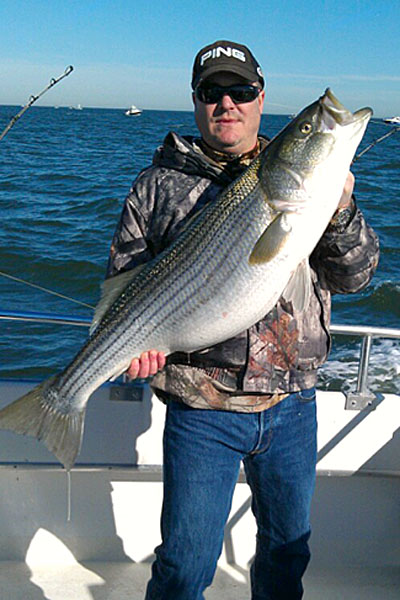
the Virginia Saltwater Sportfishing Association argues that lower limits of menhaden harvest would increase food for striped bass
Source: Wikipedia
Occasionally, a net will tear when the Ocean Harvesters boats working for Omega Proteins are catching menhaden. If the tear occurs when the net is tight and the boat close to pumping the fish into its hold, then the survival rate of the fish dropped out of the net is poor. If a tear in the net occurs and the fish wash onto a nearby beach, large pools of dead fish become a public relations issue as well as a resource management issue.
Ocean Harvesters reported in 2021 that over the last four years, nets had been set 10,000 times and there had been 12 tears, with just three in the Chesapeake Bay and the rest in the Atlantic Ocean. Total spills were estimated to be less than 1% of the annual harvest cap.30
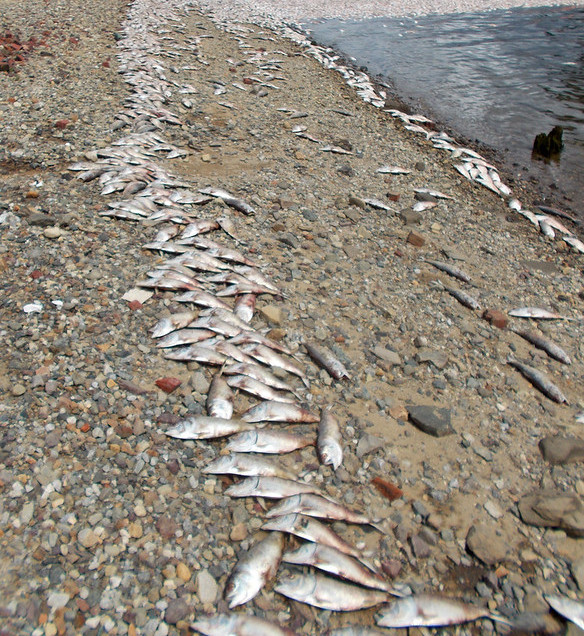
menhaden fish kills impact recreational opportunities on beaches in Massachusetts as well as in Virginia
Source: Massachusetts Department of Environmental Protection, DSCN0404 - Mystic River Fish Kill
The relative rarity provided little solace to people on July 5, 2022 who were planning to spend the Fourth of July weekend at Silver Beach, on the bay side of Northampton County. Ocean Harvesters was catching menhaden for delivery to Omega Protein's rendering plant in Reedville. A net broke, causing dead menhaden to cover the beach.
The smell of the rotting fish made the beach unusable for recreation. After a cleanup crew gathered the fish off the beach, the fish-filled dumpsters were left in a local parking lot for several days because both the Accomack and Northampton county landfills refused to accept the organic waste. Accomack County categorized the dumpsters as filled with waste from an "industrial accident," and the landfill was for residential waste only.31
A second wave of dead fish reached the beach at Kiptopeke State Park, Pickett Harbor, and Sunset Beach later in July. An Ocean Harvesters vessel caught large red drum in a net. The net was opened to release the "bycatch," and once again many dead fish washed ashore. One vacationer told the local TV station:32
After the spill, the chair of the Northampton County Board of Supervisors noted the geographic imbalance between costs and benefits of a menhaden fishery in which all the jobs were based in Reedville (Northumberland County):33
The two incidents led to another round of calls from recreational angling advocates, such as the Virginia Saltwater Sportfishing Association, and people concerned about overfishing the menhaden population. They pushed for the Virginia Marine Resources Commission to permit large-scale industrial menhaden fishing only in the Atlantic Ocean and eliminate it from the Chesapeake Bay. Small-scale commercial fishing for bait fish, used in crab pots, would still be permitted. Pressure included presenting a petition in October, 2022 with 11,000 signatures to the office of Gov. Glenn Youngkin.
The president of Ocean Harvesters said the two spills in 2022 cost $250,000 to clean up. He claimed:34
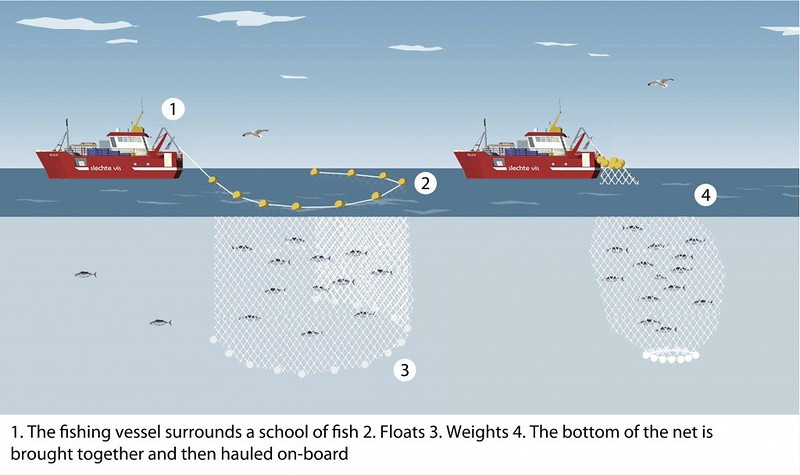
Ocean Harvesters reported there was just one spill for every 1,000 times a purse seine was set
Source: Lauren Packard, Purse-Seine
At the end of 2022, Ocean Harvesters and the Virginia Marine Resources Commission agreed that fishing for menhaden would be banned for 1/2 mile from the Chesapeake Bay Bridge-Tunnel. The company also agreed not to fish in the Chesapeake Bay on Memorial and Labor Day weekends, and on the July 4 weekend.
A proposal to ban the purse seine fishing within one mile of the shoreline was dropped after the company said such a restriction would reduce its catch by 18%, and most fishing close to the shoreline was far from areas where tourists concentrated. According to Ocean Harvesters, there was just one spill for every 1,000 times a purse seine was set.
The Virginia Marine Resources Commission voted 5-4 to accept the agreement, rather than establish a legally-binding requirement. A spokesperson said the company was committed to the deal:35
Between 2018-2022, there were 17 net spills from both the bait fishery and Omega Protein's commercial harvest operations. In 2023, Omega Protein added another vessel to its fleet. The Hopeful Harvest, based at Reedville, was intended to capture any fish released from a net spill. Menhaden float to the surface about 24 hours after a spill, so the boat would have time to reach any spot in the Chesapeake Bay before fish began to wash ashore.36
The 2022 agreement between Ocean Harvesters and the Virginia Marine Resources Commission did not resolve the conflict between the recreational fishing industry (particularly charter boats) and the commercial fishing by Omega Protein.
In 2022, the Atlantic States Marine Fisheries Commission evaluated the Ecological Reference Point (ERP) for striped bass. The commission concluded the species was no longer being overfished and the striped bass population was on track to recover by 2029, so an increase in the menhaden catch would not constrain the food supply of striped bass. The 2023-2025 Total Allowable Catch (TAC) of menhaden was increased 20%. For menhaden, reproductive capacity was above both the Ecological Reference Point threshold and target in 2021, and total fishing mortality had been below both the Ecological Reference Point threshold and target.
The Virginia Marine Resources Commission then allocated 90% of the increased menhaden catch to the commercial fishing sector and set aside only 10% for recreational fishing. In 2023, the Chesapeake Legal Alliance sued the Virginia Marine Resources Commission on behalf of the Southern Maryland Recreational Fishing Organization, claiming the process for changing the catch allocation had violated Virginia law.
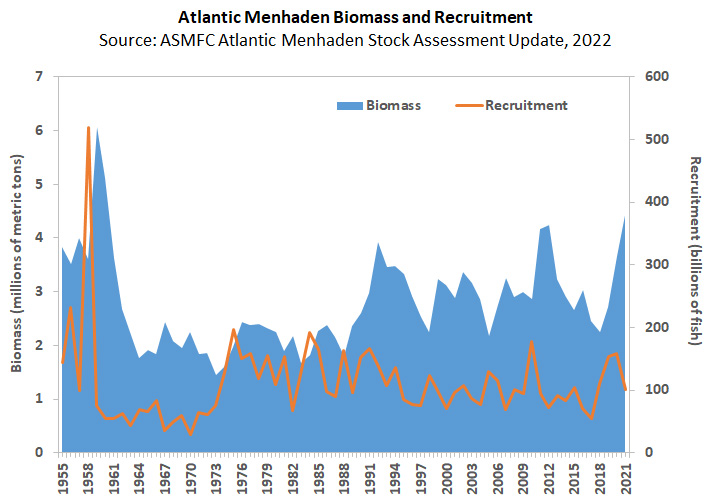
assuming an increase in the menhaden population, in 2022 the Atlantic States Marine Fisheries Commission approved an increase in Total Allowable Catch (TAC)
Source: Atlantic States Marine Fisheries Commission, Atlantic Menhaden
The Southern Maryland Recreational Fishing Organization represented the striped bass charter industry in Maryland, but the Virginia Saltwater Sportfishing Association also voiced support for the lawsuit. The president of the Virginia group said:37
A Richmond City Circuit Court judge ruled in 2023 that the lawsuit could proceed. There was potentially enough substance to the claim that the decision by the Virginia Marine Resources Commission to raise the commercial harvest limit had violated Virginia law.38
Omega Protein questioned the assessment in 2022 at Mobjack Bay that ospreys were unable to successfully raise chicks in the Chesapeake Bay because the menhaden population was too low. The study showed that male osprey increased the time spent hunting while females were sitting on the nest, and the catch per unit effort declined substantially. However, the decline in the delivery rate of menhaden back to the nests was valid for just Mobjack Bay and not necessarily applicable to the entire Chesapeake Bay.39
In response, the Center for Conservation Biology at the College of William and Mary conducted a broader study involving 511 osprey pairs distributed among twelve study areas. In 2024 it released a report on the status of osprey which nest in areas with at least 10 parts per thousand (ppt) salinity. (The Atlantic Ocean is 35ppt.) Birds nesting in high-salinity areas are more dependent upon menhaden that osprey nesting in fresher water.
To maintain existing population levels, ospreys must produce 1.15 young/pair. In areas with fresher water, where the birds are not dependent upon menhaden, breeding success was 1.36/pair. In the areas with salinity greater than 10ppt, breeding success was below 1.0/pair and "asymmetric broods" were common.
Multiple eggs hatched, but in nests where the adults could not deliver enough food one chick would grow faster than its siblings and dominates the nest. Smaller siblings died if food remained insufficient for all the chicks, and the nest produced just one or zero chicks.
The Center for Conservation Biology made clear that the shortage of menhaden was the cause of the osprey nest failures in the Chesapeake Bay:40
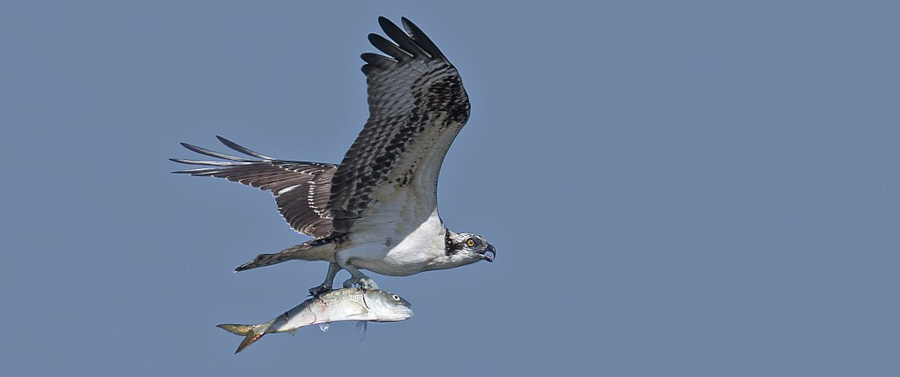
osprey depend upon oil-rich menhaden to raise a brood of chicks
Source: Russ, Osprey with bunker (menhaden)
Even though reproduction by ospreys nesting in the main stem of the Chesapeake Bay was approximately 50% of the level required for population maintenance, osprey could migrate in from other watersheds. Along the Atlantic Ocean, the species population had increased 600% between 1966-2022 according to a different study by the US Geological Survey (USGS).
To counter the argument that the menhaden catch in the Chesapeake Bay had to be reduced in order to maintain a stable osprey population, an Omega Protein spokesperson highlighted that there was:41
In 2025, The Center for Conservation Biology at the College of William and Mary reported that there were only nine pairs of mating ospreys on the Atlantic Ocean side of the Eastern Shore. The number of chicks produced from nests was only about half the total required to maintain the population, and it was thought to be "near complete collapse." Scientists considered the most likely cause to be inadequate food for the chicks to grow to maturity and fledge:42
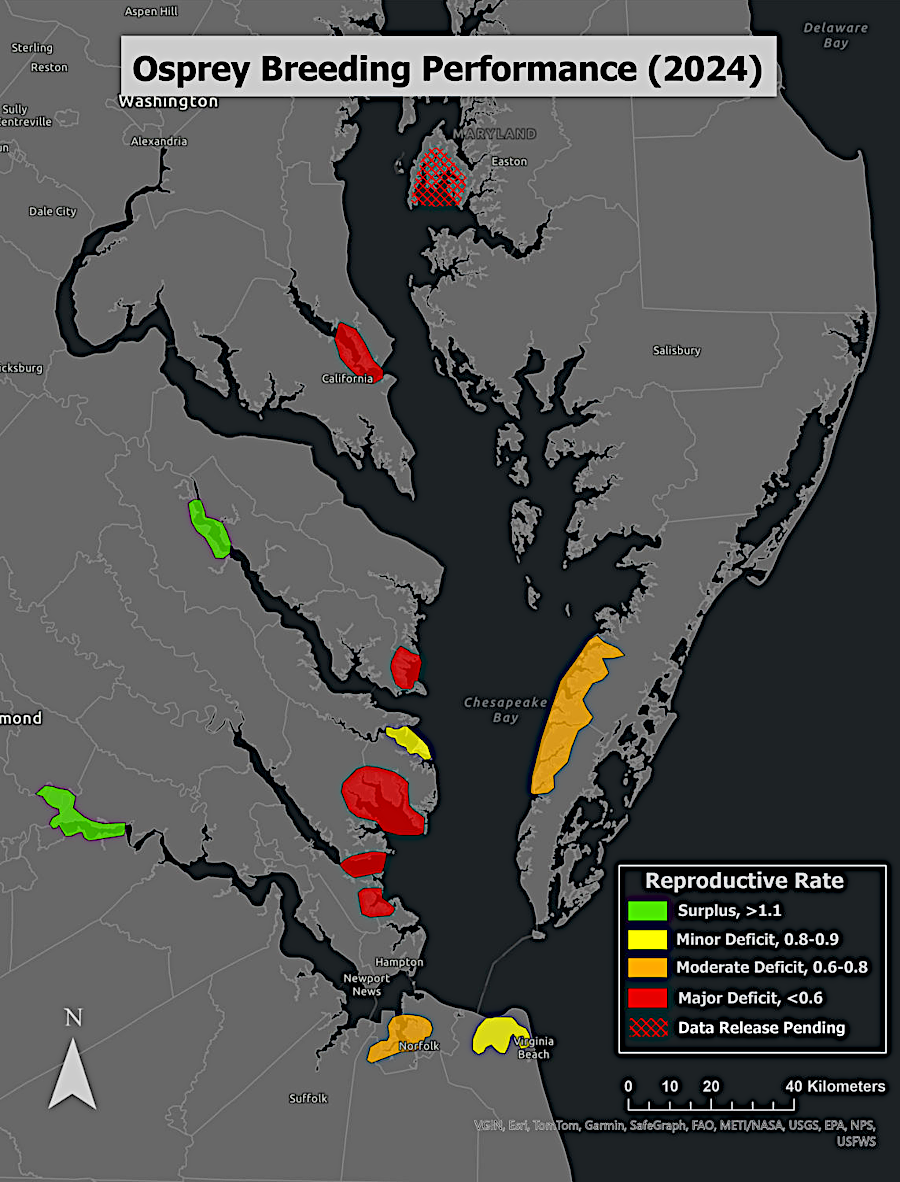
where osprey depend upon menhaden for food, nests are producing fewer chicks than required to maintain the Chesapeake Bay population
Source: Center for Conservation Biology, Chesapeake Bay ospreys continue to experience poor breeding performance due to starvation
The 2025 study revealed that in freshwater areas of the Chesapeake Bay, osprey pairs were producing an average of 0.8-1.3 chicks per year. That was sufficient to replace the local ospreys who died each year, but in saltier waters ospreys produced an average of only 0.25 young per pair.
A likely reason for the difference was the availability of fish. Catfish, which lived in the freshwater areas, may be more abundant. The primary cause for osprey nest failures in the saltier zone of the bay was loss of young after hatching due to starvation. Additional research was required to determine if a reduced menhaden population in saltier waters was the key factor.
A prominent wildlife biologist was able to conclude from the study:43
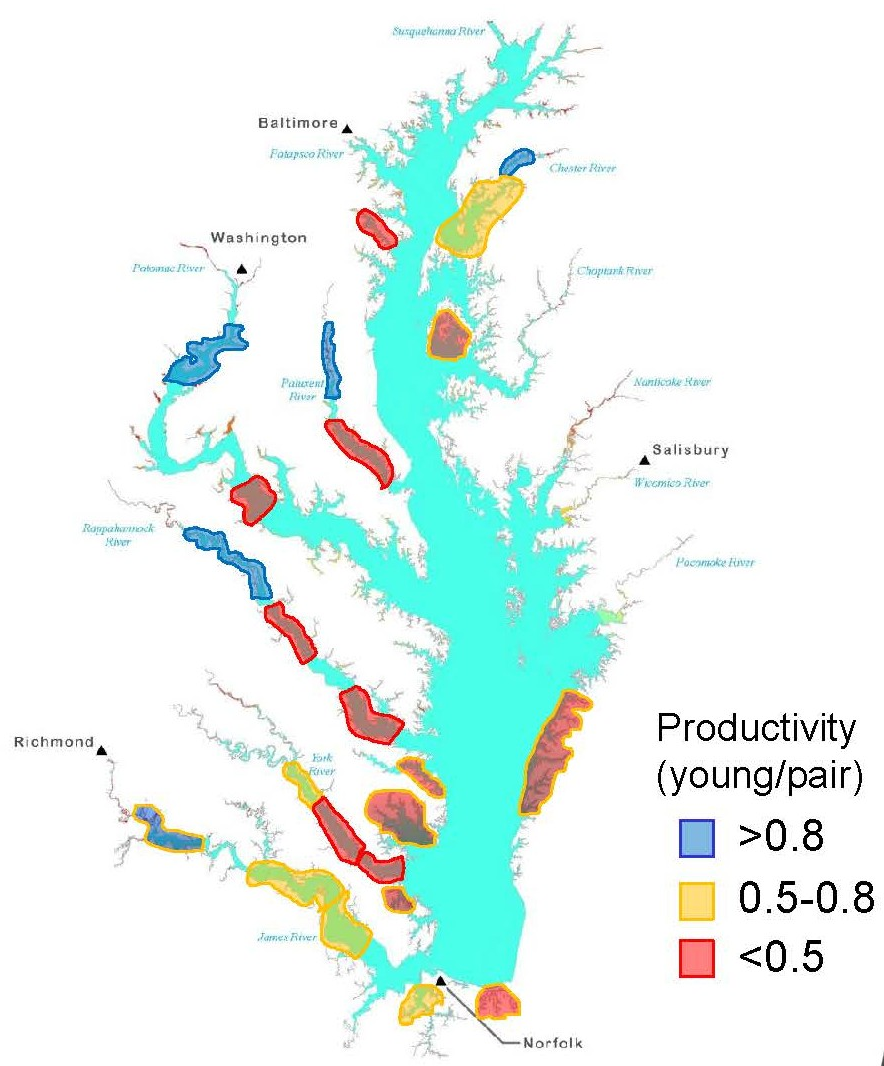
in 2025, osprey reproduction varied significantly between freshwater and saltwater zones in the Chesapeake Bay
Source: Center for Conservation Biology, Deficit in breeding performance expands for Chesapeake Bay ospreys
At the end of 2025, the Atlantic States Marine Fisheries Commission cut the total allowable catch (TAC) of menhaden. The population had declined 37% since 2022. Fishery biologists recommended reducing the harvest by half, and even then there would be only a 50% chance that there would be enough menhaden to support the striped bass population. Commissioners paid attention to the economic impact of such a dramatic reduction and chose to lower the authorized harvest by only 20% - back to the total allowable catch set before 2022.
The decision did not affect the 51,000 metric ton cap on harvest within the Chesapeake Bay. That bay-specific limit was set in 2006; the rest of the authorized Virginia catch occurs in the Atlantic Ocean.
Virginia retained its allocation of 75% of the national total allowable catch. All other states used menhaden only for bait, but Omega Protein converts the fish in its Reedville factory into a variety of health, industrial, and agricultural products.
In its 2025 meeting, the Atlantic States Marine Fisheries Commission launched a study that could result in a revision of the Chesapeake Bay limit. One possibility was to establish additional area-specific limits to distribute fishing pressure.
The commission also authorized a research study described as a "roadmap" to identifying the gaps in scientific data needed to evaluate better the impact of menhaden fishing in Virginia waters. The General Assembly had declined to fund the research which was recommended in 2023 by the Virginia Institute of Marine Science to develop a scientifically-derived harvest cap for the Chesapeake Bay. The "roadmap" was a preliminary effort to identify the fieldwork and labwork required, if such research was funded.44
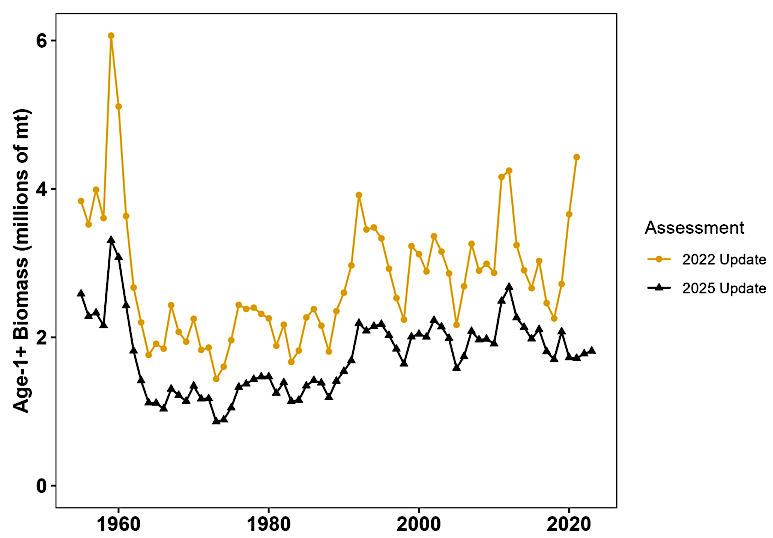
the estimate of menhaden biomass produced for the Atlantic States Marine Fisheries Commission declined 37% between 2022-2025
Source: Atlantic Menhaden Technical Committee and Ecological Reference Point Workgroup, Stock Projections to Inform 2026-2028 Total Allowable Catch Levels (Figure 4, October 9, 2025)
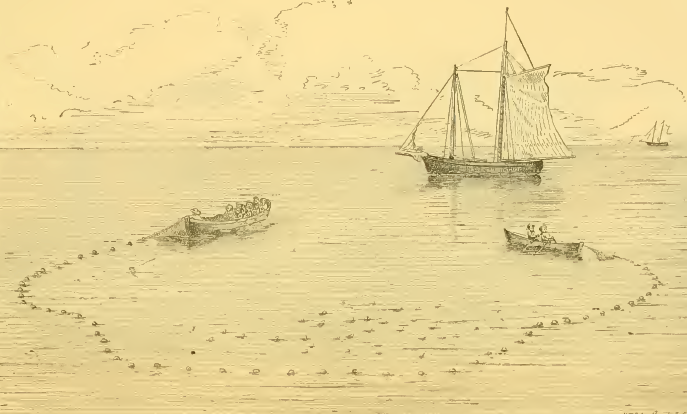
because menhaden travel in schools, purse seines were used to catch menhaden even before steam-powered vessels were common
Source: A History of the Menhaden (1880, Figure 12)
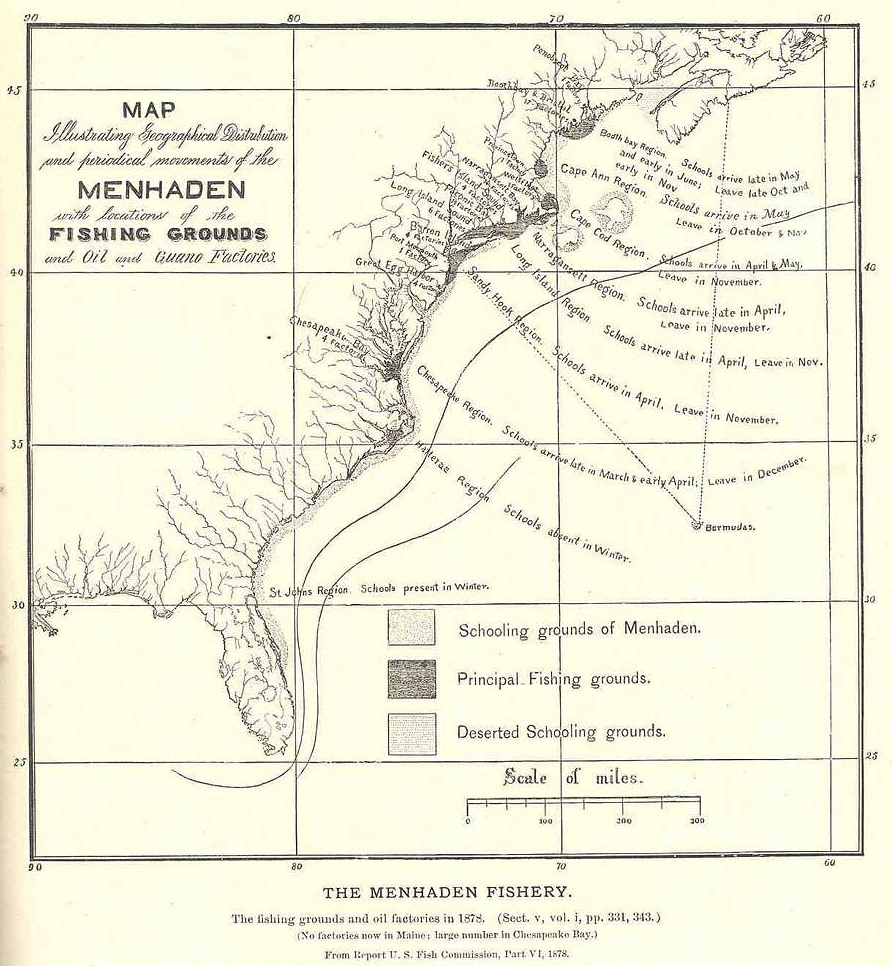
menhaden factories processing the fish once extended into New England
Source: PICRYL, FMIB 35802 Menhaden Fishery